Comprehensive Guide to Garden Maintenance in Poplar
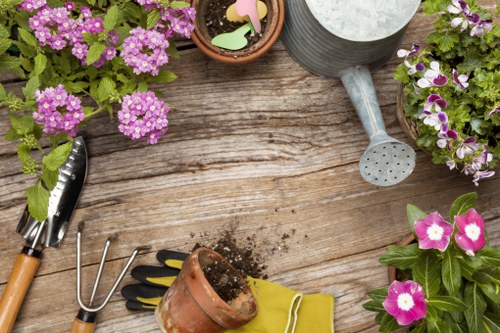
Introduction to Garden Maintenance
Maintaining a beautiful garden in Poplar requires dedication, knowledge, and the right set of tools. Whether you’re a seasoned gardener or just starting, understanding the unique climate and soil conditions of Poplar is essential for thriving plants.
In this article, we will explore essential garden maintenance tips tailored specifically for Poplar residents. From soil preparation to pest control, we’ve got you covered.
Effective garden maintenance not only enhances the aesthetic appeal of your outdoor space but also promotes a healthy and sustainable environment.
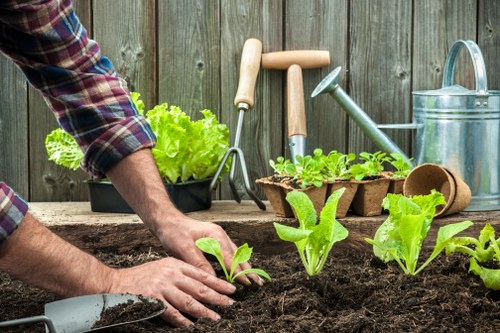
Understanding Poplar’s Climate
Climate Overview
Poplar experiences a temperate climate with distinct seasons. Summers are warm, while winters can be quite chilly. Understanding these seasonal changes is crucial for planning your garden maintenance activities.
The average rainfall in Poplar is moderate, providing adequate moisture for most garden plants. However, it’s important to monitor weather patterns to protect your garden from unexpected frost or excessive heat.
By aligning your garden maintenance schedule with Poplar’s climate, you can ensure the longevity and health of your plants.
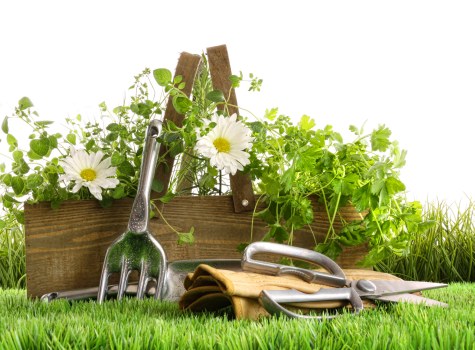
Soil Preparation and Maintenance
Testing Your Soil
Healthy soil is the foundation of any thriving garden. Start by testing your soil’s pH levels and nutrient content. Poplar’s soil can vary, so understanding its composition will help you make informed decisions about amendments.
Use a soil testing kit or consult with local agricultural extensions to get accurate readings. Based on the results, you can add necessary nutrients like compost, manure, or specific fertilizers to enhance soil fertility.
Regular soil testing ensures that your garden remains productive and that plants receive the essential nutrients they need to flourish.
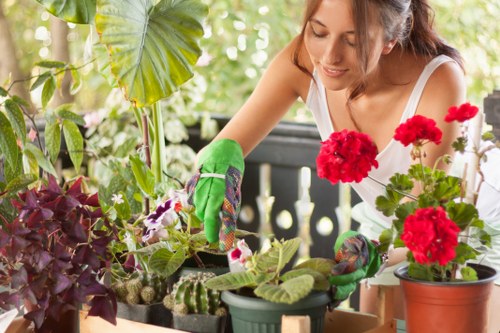
Plant Selection and Care
Choosing the Right Plants
Selecting plants that are well-suited to Poplar’s climate is vital for minimizing maintenance efforts and maximizing growth. Opt for native species and those that are known to thrive in similar environments.
Consider factors such as sunlight, water requirements, and growth habits when choosing plants. Grouping plants with similar needs can simplify your maintenance routine and promote a harmonious garden ecosystem.
Additionally, incorporating a mix of perennials and annuals can ensure year-round beauty and continuous blooms throughout the seasons.
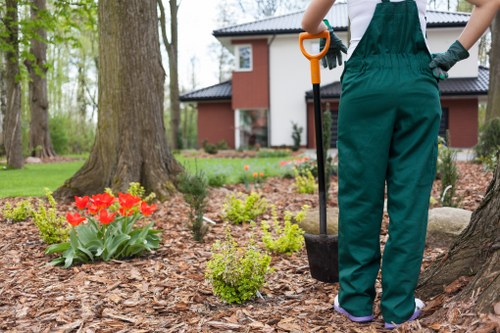
Pest and Disease Management
Identifying Common Pests
Pests can pose a significant threat to your garden’s health. In Poplar, common pests include aphids, slugs, and caterpillars. Regular monitoring and early detection are key to preventing infestations.
Implement natural pest control methods such as introducing beneficial insects, using organic sprays, or setting up barriers to protect your plants. Avoid relying heavily on chemical pesticides, as they can harm beneficial organisms and degrade soil quality.
Healthy garden practices, such as proper spacing and adequate watering, also reduce the likelihood of pest problems by creating an environment less favorable to unwanted visitors.

Watering Techniques
Efficient Watering Practices
Watering is a critical aspect of garden maintenance. In Poplar, where rainfall is moderate, it’s important to establish a consistent watering schedule to supplement natural moisture, especially during dry spells.
Implementing drip irrigation systems or soaker hoses can conserve water by delivering it directly to the plant roots, reducing evaporation and runoff. Mulching around plants also helps retain soil moisture and regulate temperature.
Avoid overwatering by checking soil moisture levels regularly. Signs of overwatering include yellowing leaves and root rot, which can compromise plant health.

Pruning and Trimming
Best Practices for Pruning
Regular pruning and trimming are essential for maintaining the shape and health of your plants. In Poplar, pruning should be done during the dormant season to minimize stress on the plants and encourage new growth in the spring.
Remove dead or diseased branches, and thin out dense areas to improve air circulation. Proper pruning techniques enhance the aesthetic appeal of your garden and prevent potential issues caused by overgrown foliage.
Invest in quality pruning tools and keep them well-maintained to ensure clean cuts and reduce the risk of transmitting diseases between plants.

Weed Control
Effective Weed Management Strategies
Weeds compete with your garden plants for nutrients, water, and light. Effective weed control is essential for maintaining a healthy garden in Poplar.
Employ a combination of manual removal, mulching, and the use of organic herbicides to keep weed populations in check. Regularly inspect your garden beds and address weed issues promptly to prevent them from spreading.
Encouraging healthy plant growth through proper fertilization and watering also helps naturally suppress weed growth by limiting their available resources.

Seasonal Garden Maintenance
Spring Maintenance Tips
Spring is the perfect time to prepare your garden for the growing season. Start by cleaning up debris from the winter months and preparing the soil for planting.
Plant new flowers and vegetables, and apply a balanced fertilizer to support robust growth. Pruning shrubs and trees during spring ensures they develop a strong structure for the year ahead.
Regularly monitor your garden for any signs of pests or diseases and address them promptly to prevent long-term damage.

Tools and Equipment
Essential Gardening Tools
Having the right tools can make garden maintenance in Poplar much more manageable. Essential tools include a reliable hose, pruning shears, a trowel, and a spade.
Invest in high-quality tools that are comfortable to use and durable enough to withstand regular use. Proper maintenance of your tools, such as cleaning and sharpening, ensures they remain effective and last longer.
Consider ergonomic tools to reduce strain and improve efficiency during extended gardening sessions.

Lawn Care
Maintaining a Healthy Lawn
A well-maintained lawn enhances the overall appearance of your garden. In Poplar, regular mowing, aeration, and fertilization are key to keeping your grass lush and green.
Mow your lawn to the appropriate height for your grass type to encourage deep root growth and prevent weeds from taking over. Aerating the soil annually helps improve water and nutrient absorption.
Apply a suitable fertilizer based on your lawn’s needs, and ensure consistent watering practices to promote a resilient and vibrant lawn.

Mulching Benefits
Why Mulch Your Garden
Mulching offers numerous benefits for garden maintenance in Poplar. It helps retain soil moisture, suppresses weed growth, and regulates soil temperature, creating a more stable environment for your plants.
Choose organic mulches like bark, straw, or compost, which decompose over time and enrich the soil with essential nutrients. Apply a 2-3 inch layer around your plants, ensuring you leave space around stems and trunks to prevent rot.
Regularly replenish mulch as it breaks down to maintain its effectiveness and continue providing benefits to your garden.

Composting
Creating a Sustainable Compost
Composting is a sustainable practice that supports garden maintenance by recycling organic waste into nutrient-rich compost. This natural fertilizer improves soil structure and fertility, reducing the need for chemical fertilizers.
Set up a compost bin in your garden and add a balanced mix of green (vegetable scraps, grass clippings) and brown (leaves, straw) materials. Turn the compost regularly to aerate it and speed up the decomposition process.
Use finished compost to enrich your soil, enhance plant growth, and promote a healthy garden ecosystem.

Pruning Trees and Shrubs
Maintaining Tree Health
Regular pruning of trees and shrubs is essential for their health and longevity. In Poplar, proper pruning techniques help prevent disease, promote air circulation, and maintain desired shapes.
Remove dead or diseased branches first, followed by any that are crossing or rubbing against each other. Thinning out dense areas allows light and air to penetrate the canopy, reducing the risk of pests and fungal infections.
Prune at the appropriate time of year for each plant species to minimize stress and encourage optimal growth.

Patio and Hardscape Maintenance
Keeping Outdoor Spaces Pristine
Your garden’s patio and hardscape features contribute significantly to its overall appeal. Regular maintenance ensures these areas remain functional and attractive.
Clean patios by sweeping and power washing to remove dirt and moss. Inspect hardscape features for cracks or damage and perform necessary repairs to prevent deterioration.
Consider sealing surfaces to protect against weathering and extend their lifespan. Maintaining these elements enhances the usability and beauty of your garden.

Seasonal Maintenance Checklist
Organizing Your Garden Tasks
A seasonal maintenance checklist helps keep your garden in top condition throughout the year. Here’s a brief overview:
- Spring: Soil preparation, planting, pruning.
- Summer: Watering, weeding, pest control.
- Autumn: Leaf removal, composting, preparing for winter.
- Winter: Tool maintenance, protecting sensitive plants.
Adhering to a seasonal checklist ensures no aspect of garden maintenance is overlooked, promoting a healthy and vibrant garden year-round.
Stay organized and proactive with your garden tasks to enjoy a flourishing outdoor space in Poplar.

Benefits of Regular Garden Maintenance
Enhancing Your Outdoor Space
Consistent garden maintenance offers numerous benefits beyond aesthetic appeal. A well-maintained garden improves air quality, provides a habitat for beneficial insects, and contributes to mental well-being.
Moreover, regular maintenance prevents costly repairs and replacements by addressing issues early on. Investing time and effort into garden upkeep pays off with a resilient and beautiful landscape.
Embrace garden maintenance as a rewarding activity that enhances both your property value and personal satisfaction.

Hiring Professional Garden Services
When to Seek Expert Help
While DIY garden maintenance is rewarding, there are times when hiring professional services in Poplar can be beneficial. Professionals bring expertise, efficiency, and specialized equipment to handle complex tasks.
Consider hiring experts for large-scale projects, intricate pruning, pest management, or when you lack the time to maintain your garden effectively.
Investing in professional garden services ensures high-quality maintenance and allows you to enjoy your garden without the stress of upkeep.

Eco-Friendly Gardening Practices
Promoting Sustainability
Adopting eco-friendly gardening practices contributes to a sustainable environment in Poplar. Utilize organic fertilizers, practice water conservation, and encourage biodiversity in your garden.
Implementing rainwater harvesting systems and using native plants reduces your garden’s ecological footprint. Composting and recycling garden waste also support sustainable maintenance.
Embracing green gardening practices not only benefits your garden but also the broader ecosystem, fostering a healthier community.

Conclusion
Garden maintenance in Poplar is a rewarding endeavor that transforms your outdoor space into a thriving oasis. By understanding the local climate, preparing your soil, selecting the right plants, and employing effective maintenance strategies, you can achieve a beautiful and sustainable garden.
Remember to incorporate regular watering, pruning, pest control, and seasonal tasks into your routine. Whether you choose to maintain your garden yourself or hire professionals, consistent care is key to long-term success.
Contact us today to learn more about professional garden maintenance services in Poplar and take the first step towards cultivating your dream garden.